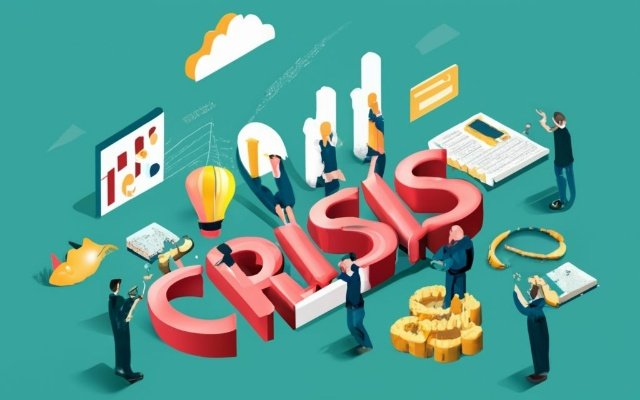A crisis manager, often referred to as a crisis management professional or crisis response specialist, is an individual who specializes in strategizing and implementing effective responses to a wide range of unexpected and potentially damaging events that can threaten an organization’s operations, reputation, and overall stability. These professionals are central to an organization’s ability to navigate tumultuous situations and mitigate the adverse impacts of crises.

A crisis manager is typically a seasoned and skilled individual who possesses a unique skill set and a deep understanding of crisis management principles.
Organizations face a wide array of crises that can threaten their reputation, operations, and even their very existence. To effectively weather these storms, organizations rely on crisis managers, professionals who possess a unique skill set and play a crucial duty in crisis management.
One of the primary responsibilities of a crisis manager is to anticipate and prepare for potential crises. This involves conducting comprehensive risk assessments to identify vulnerabilities within the organization’s structure and operations.
By analyzing various scenarios and potential threats, they can develop robust crisis management plans that outline how the organization should respond when a crisis unfolds. These plans encompass everything from communication strategies to resource allocation and legal considerations.
What are the Duties and Responsibilities of a Crisis Manager?
The following are the roles and responsibilities of a crisis manager, shedding light on the multifaceted nature of their work.
1. Risk Assessment and Preparedness
At the nucleus of a crisis manager’s role lies the intricate task of risk assessment and preparedness. This involves a systematic evaluation of the diverse risks and vulnerabilities inherent within an organization’s operations.
A crisis manager employs a combination of quantitative and qualitative methods to identify potential threats, from financial risks and operational hazards to reputational vulnerabilities.
In this capacity, they engage in comprehensive scenario planning, crafting vivid simulations of potential crises that could beset the organization. These scenarios extend beyond mere disaster recovery; they encompass multifaceted contingencies such as cyberattacks, natural disasters, supply chain disruptions, and even public relations nightmares.
Through this proactive foresight, crisis managers anticipate the unthinkable and craft resilient strategies to preempt, mitigate, or respond to these scenarios.
Moreover, crisis managers are entrusted with the development and maintenance of robust crisis management plans. These blueprints delineate the precise actions to be undertaken when a crisis unfolds, specifying roles, responsibilities, communication protocols, and resource allocation. These plans serve as the lynchpin of preparedness, aligning the organization’s responses with strategic objectives and compliance considerations.
2. Establishing Communication Protocols
In the realm of crisis management, the efficacy of communication cannot be overstated. Crisis managers assume the pivotal responsibility of architecting and instituting meticulous communication protocols that serve as the lifeblood of crisis response.
Internally, they orchestrate the allocation of roles and responsibilities for conveying information within the organization. This often involves designating a crisis management team and defining hierarchies to ensure that key decision-makers are informed swiftly and accurately.
These protocols encompass the initiation of crisis alerts, the mobilization of response teams, and the dissemination of information vital to crisis mitigation.
Externally, crisis managers choreograph the dissemination of information to a myriad of stakeholders, encompassing customers, shareholders, regulatory bodies, and the media. The manner in which information is conveyed during a crisis can significantly impact public perception and organizational reputation.
Therefore, crisis managers are experts in tailoring their messages to diverse audiences, balancing transparency with strategic framing, and consistently delivering accurate and timely updates.
3. Leading Crisis Response Teams
An inherent aspect of crisis management is the orchestration of crisis response teams. These teams comprise specialists drawn from various departments within the organization, each with a unique skill set and expertise relevant to the crisis at hand.
Crisis managers not only assemble these teams but also provide leadership and direction during the tumultuous times of a crisis. They are responsible for assigning roles, ensuring that team members understand their responsibilities, and fostering a collaborative atmosphere conducive to effective problem-solving.
In essence, the crisis manager serves as the conductor of this multifaceted symphony, orchestrating the efforts of diverse professionals to execute the crisis management plan efficiently.
They navigate the complexities of team dynamics, steering the collective focus toward the resolution of the crisis while maintaining the organizational ethos and values.
4. Decision-Making Under Pressure
The crucible of a crisis demands rapid and often high-stakes decision-making. Crisis managers bear the weighty responsibility of making decisions under intense pressure, knowing that the choices they make can significantly impact the organization’s future.
These decisions encompass a wide spectrum, ranging from immediate tactical choices, such as evacuation orders during a natural disaster, to strategic decisions with far-reaching consequences, such as whether to issue a public apology or recall a product.
Crisis managers must evaluate an array of complex factors, including safety considerations, legal obligations, financial implications, and public perception, all while operating within tight timeframes.
Effective decision-making under pressure necessitates not only a deep understanding of crisis management principles but also a keen sense of judgment, adaptability, and an ability to stay focused amidst chaos.
5. Managing Resources
Resource allocation is a critical aspect of crisis management. Crisis managers must ensure that the necessary resources, including personnel, finances, and equipment, are available and deployed efficiently to address the crisis effectively.
This encompasses:
- Personnel: Identifying and mobilizing the right individuals with the requisite skills and knowledge to handle specific aspects of the crisis.
- Finances: Allocating funds for immediate needs, such as emergency response and recovery efforts, and forecasting longer-term financial requirements.
- Equipment and Technology: Ensuring that essential tools and technology, whether for communication, data analysis, or emergency response, are readily accessible and in working order.
Resource management is a dynamic process, often requiring rapid adjustments as the crisis unfolds and new information emerges.
Crisis managers must strike a delicate balance between deploying resources judiciously to meet immediate needs and conserving resources for the duration of the crisis.
6. Maintaining Legal and Ethical Compliance
The terrain of crisis management is laden with legal and ethical considerations. Crisis managers are tasked with navigating this complex landscape, ensuring that the organization’s response to the crisis remains both legally sound and ethically principled.
Legal considerations encompass a spectrum of issues, from compliance with industry-specific regulations to potential liabilities arising from the crisis.
Crisis managers work closely with legal counsel to assess legal risks, adhere to reporting requirements, and make decisions that safeguard the organization from legal repercussions.
On the ethical front, crisis managers must uphold the organization’s core values and ethical standards even in the face of adversity. This includes protecting the rights and privacy of employees and stakeholders, maintaining transparency when appropriate, and avoiding actions that could tarnish the organization’s ethical reputation.
7. Stakeholder Management
Effective stakeholder management is fundamental to resolving crises. Crisis managers serve as the primary liaisons between the organization and its various stakeholders, both internal and external.
This involves maintaining open lines of communication, managing expectations, and ensuring that all stakeholders are adequately informed throughout the crisis.
Internally, crisis managers work closely with employees to provide clear guidance and reassurance. They engage with management to make key decisions that align with the best interests of the workforce while safeguarding the organization’s stability.
Externally, crisis managers interface with shareholders, customers, suppliers, and the wider community. Building and preserving trust with these groups is paramount. They must convey a sense of empathy and responsibility while addressing concerns, which can range from safety and security to financial stability.
8. Media Relations
In the digital age, managing media relations during a crisis requires specialized skills. Crisis managers must be adept at handling media inquiries, crafting press releases, and coordinating press conferences.

They understand the power of the media to shape public perception and recognize the need to manage the narrative effectively.
Moreover, crisis managers must work diligently to control the flow of information. They balance the organization’s need for transparency with the imperative to avoid inadvertently escalating the crisis. This involves providing accurate, timely, and consistent information while refraining from speculation or premature conclusions.
The ability to handle the media with poise and professionalism can make the difference between a crisis that is managed effectively and one that spirals out of control, negatively impacting the organization’s reputation.
9. Reputation Management
Preserving and restoring the organization’s reputation is an overarching responsibility of crisis managers. Reputation is a precious asset, and its erosion during a crisis can have lasting consequences. Crisis managers engage in meticulous reputation management strategies tailored to the specific circumstances of the crisis.
This may involve proactive efforts such as crafting public statements, issuing apologies, or demonstrating a commitment to rectifying issues. Crisis managers also consider long-term reputation recovery, implementing strategies to rebuild trust and credibility in the aftermath of the crisis.
They monitor public sentiment, social media chatter, and media coverage to gauge the impact of the crisis on the organization’s image.
Adjusting strategies as needed, they work tirelessly to repair any damage to the organization’s reputation and fortify it against future challenges.
10. Continuity Planning
Business continuity planning is integral to crisis management. Crisis managers are responsible for developing and maintaining these plans, which outline how the organization can continue its essential functions during and after a crisis.
Continuity plans encompass a range of considerations, from technology and data recovery to employee safety and supply chain resilience. They ensure that critical operations remain viable, allowing the organization to weather the storm and minimize disruptions.
In essence, crisis managers anticipate that crises may interrupt normal operations but strive to ensure that these interruptions are temporary and manageable. Continuity planning is an ongoing process, with crisis managers continually reviewing and updating plans to adapt to evolving threats and circumstances.
11. Training and Education
Preparing the organization for crises extends beyond the planning phase. Crisis managers are responsible for training employees at all levels, ensuring they understand their roles and responsibilities when confronted with crisis situations.
This training covers a broad spectrum, including crisis response protocols, safety procedures, communication guidelines, and the use of crisis management tools and technologies.
Crisis managers coordinate drills and simulations to test the organization’s readiness and identify areas for improvement.
A well-trained workforce is a valuable asset during a crisis. Employees who are knowledgeable about crisis procedures can respond more effectively, contributing to a smoother crisis management process.
12. Monitoring and Evaluation
Post-crisis assessment is a critical phase of crisis management. Crisis managers conduct thorough evaluations to analyze the organization’s response. This includes an examination of what went well, what could have been improved, and areas where the crisis management plan needs adjustment.
These evaluations are not only retrospective but also forward-looking. Crisis managers use the insights gained to refine crisis management strategies, update plans, and enhance preparedness for future crises.
Monitoring and evaluation are continuous processes, ensuring that the organization learns from each crisis experience and becomes more resilient over time.
13. Psychological Support
The emotional toll of a crisis can be profound, affecting employees, stakeholders, and even crisis managers themselves.
Crisis managers may need to provide or coordinate psychological support services to help those affected by the crisis cope with the emotional aftermath.
This can involve arranging for counseling services, support groups, or crisis hotlines. Crisis managers understand the importance of addressing the psychological well-being of individuals who have experienced trauma, as it directly impacts their ability to recover and contribute to the organization’s resilience.
14. Adaptability and Innovation
Crisis managers must embrace adaptability and innovation in their approach. No two crises are identical, and the ability to think creatively and adjust strategies on the fly is crucial.

They continuously scan the horizon for emerging threats and trends, recognizing that the landscape of crises is ever-evolving. This proactive stance enables them to identify potential vulnerabilities and develop innovative solutions before crises escalate.
Adaptability and innovation are not merely survival strategies; they are catalysts for organizational growth and resilience in the face of adversity.
15. Global Perspective
In our interconnected world, crises can have international repercussions. Crisis managers must maintain a global perspective, understanding how global events and trends may impact their organization and its response to crises.
This entails monitoring global news and geopolitical developments and assessing the potential ripple effects on the organization’s operations, supply chain, and stakeholder relations. It also involves considering the broader implications of crises, such as their impact on international markets or regulatory changes.
A global perspective allows crisis managers to anticipate and prepare for the wide-reaching consequences of crises, ensuring that their organization remains agile and adaptive in the face of global challenges.
Conclusion:
The role of a crisis manager is a multifaceted, exacting, and indispensable one. These seasoned professionals operate as the pivotal conduit between an organization and the tumultuous milieu of crises, ensuring the orchestration of requisite strategies, adept communication, and judicious resource allocation to endure and emerge fortified from these trials.
Through the assiduous cultivation of these roles and responsibilities, crisis managers not only facilitate an organization’s survival through crises but also position it for resurgence and fortification. In an ever-evolving world, their expertise and acumen stand as unwavering bastions against the vagaries of uncertainty.

